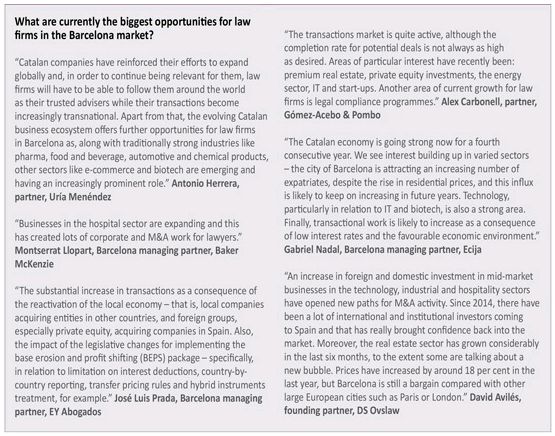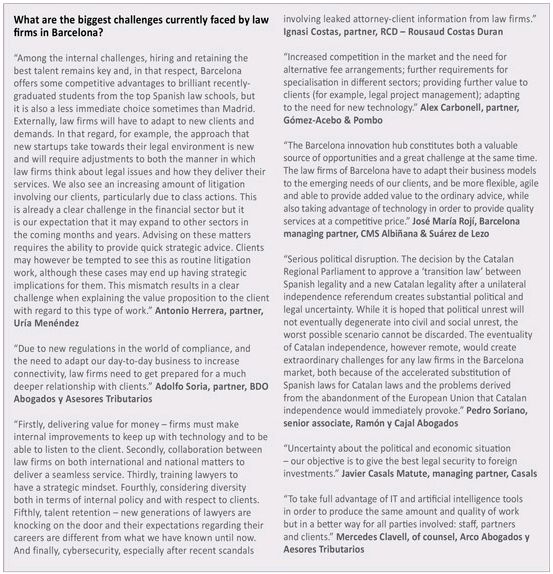The innovative nature of the Barcelona economy is both a benefit and a burden for lawyers in the Catalan capital – meanwhile, if Catalonia was to achieve independence, the effect on its law firms could be "extraordinary", say some observers
Barcelona's reputation for innovation in some ways benefits, but in other ways disadvantages, the city's law firms. The capital of Catalonia is a fertile ground for business start-ups, particularly in the technology sector, and many of them look to law firms to help them get their businesses off the ground. The experience of advising a start-up can teach law firms valuable lessons about new ways of doing business and innovative methods of communicating with clients, for example. However, innovation can happen so quickly that law firms are often left trailing in its wake. As a result, firms often lack the money to invest in the infrastructure necessary to effectively support their clients, while also finding it difficult to find the type of people they need to best serve them.

Meanwhile, political machinations in Catalonia mean that steps taken by both law firms and clients are not as sure-footed as they would like. Some lawyers highlight "serious political disruption" as the biggest challenge law firms face. The more pessimistic of those say the issue of Catalan independence could potentially disintegrate into civil and social unrest. They also claim that, if Catalonia was to become independent, the effect on the region's law firms would be extraordinary, given that Spanish laws would be replaced by Catalan laws and the area would ultimately withdraw from the European Union.
Exports rising
However, despite the climate of uncertainty, Barcelona emerged well from the crisis, according to Cuatrecasas partner Héctor Bros. "Exports are up and represent around 25 per cent of the city's economy, and the city is increasingly becoming an international hub," he says. "There has also been a big boost in newer sectors such as biosciences, technology entrepreneurship, and fintech – in addition, there has been a car industry revival."
Law firms are coming up with innovative new business models to deal with the changing demands of clients, says Alex Llevat, partner at Roca Junyent. "Law firms have to adapt to new collaborative ways of doing business with clients, by using and applying technology," he says. "The challenge is to adapt to this new reality, though younger lawyers believe in this new world."
Firms are now thinking about how to provide new services, says Santiago Doce, partner at Deloitte Legal. "Law firms need to be more proactive and move to other types of business, there should be more say for junior lawyers and more flexibility and we need to invest in services."
There are new investors coming into Barcelona and internet businesses, in particular, are attracted to the city, says Enrique Viola, lawyer at Pintó Ruiz del Valle. "However, it can be difficult to go as fast as them and they are growing quickly – some of these companies come with money and some with only an idea, but they can use law firms to get investment and this can be a good way [for a law firm] to enter into a relationship with a company," he adds.

Can't get the staff?
Small entrepreneurial businesses in Barcelona are often looking for lawyers that can solve problems, says Toni de Weest Prat, managing partner of Andersen Tax & Legal in Barcelona. He adds that the city is unique and that foreign investors are investing because they cannot find similar businesses in other parts of Spain. "However, it can be difficult to find good people to serve such clients."
Ramon Faus, partner at Andersen Tax & Legal, says that, in the next ten to 15 years, "everything will be technological". He adds: "How will the legal industry change because of the technological revolution? Silicon Valley and China is deciding the future. How do we follow up what they are doing? We will soon be living in a world of cities, not states or regions." Faus says that five of the six leading technological cities in the world are in the US, Europe and Asia and consequently, "we aim to serve those cities". He adds that lawyers have to be curious about new technological industries: "We have to be humble, we have to talk their language – legal services are not better, nor different, nor special, it is just another economic industry, like any other one, and will also be affected by technology. Everything will be faster, consumers and clients will go directly to artificial intelligence for most of their legal services, the question is how will machines replace lawyers?" Faus argues that, in future, there will only be very large global law firms or very small, but high-quality, boutique firms.
Purely local is unsustainable

Around one-third to one-half of the income of the revenue of law firms in Barcelona comes from local businesses, but the market is "the world" and it is not sustainable to think purely locally, argues José María de Paz, partner at Pérez-Llorca. Meanwhile, Santiago Torent, partner at Lener, says that banks are still in the process of clearing up their balance sheets and that this is generating a lot of work for law firms. He adds that the real estate market has "reignited", though warns that there is a need to "keep focused as there is still a lot of work to do related to the crisis".
Bros says the Spanish market is quite stable and, in recent years, there has been a new wave of foreign law firms coming into the market. "There should be a role for every type of firm, but it's essential to know the client because you will be working with your client everywhere in the world," he adds. Doce says firms need to be able to invest in people and training, as well as in technology: "Law firms have to do things differently, we have to guarantee the same level of service everywhere." He adds that some clients are driving fees down. "Some big clients are trying to get good services at a low price."

'Scary' internet platforms
The way big corporations hire lawyers is changing, says De Weest Prat. "Some US corporations have internet platforms where law firms make an offer for work; that will come to Spain – this is an opportunity to change the way business is done," he adds. However, there will always be a place for personal relationships between lawyers and their clients, argues De Paz. "There is still room for lawyers to get to the position of trusted adviser," he adds. "However, you have to move to highly-complex matters to preserve profitability as commoditised work will lose profitability – knowing your client is key."
Clients using internet platforms to tender for work is "scary", according to one partner. He adds that innovation in the legal profession quickly becomes standardised and that breaking out of that cycle "requires firms to make a lot of investment in terms of time, as well as money". However, the partner also says that, when dealing with a law firm, clients want to deal with a "human being they can really trust".
Not all legal work will be standardised, lawyers say. "You sometimes need 120 lawyers to merge two financial entities and small firms can't compete," one partner says. "Additionally, highly-skilled lawyers are needed when conflicts arise – trust is important, in conflicts you have to manage human expectations in the negotiation process."

The personal touch
Though firms need to invest in technology, clients want a personal and direct contact, says Viola. "We have alliances in other countries – the alliance works, the client doesn't know the lawyer in the other jurisdiction, we don't put them in direct contact with the other lawyers, clients prefer to go together with their trusted lawyer," he adds. One partner remarks that while clients expect him to coordinate lawyers in other jurisdictions, this poses risks. "If I choose the other lawyer, this could be a problem as I'm forced to be responsible for the choice of law firm."
While some firms are members of networks, one partner argues that global firms operating under a uniform brand can sometimes be in a better position to attract clients. "There is a lot of idle talk about networks and clients know that, a single name firm has an advantage with big corporations and banks that use panels, for example – when a client does not have a personal connection they may go to a brand."
In general, business in Barcelona is improving, lawyers say. "Business is getting better, there are a lot of new entrepreneurs and new ideas – foreign investors think it is a good place," says one partner. Another remarks that Spain is now a "stable country compared to some of its neighbours in Europe".

The content of this article is intended to provide a general guide to the subject matter. Specialist advice should be sought about your specific circumstances.
